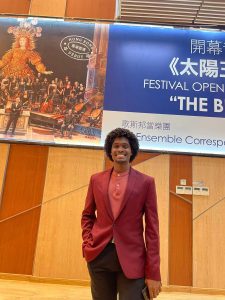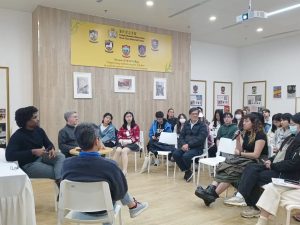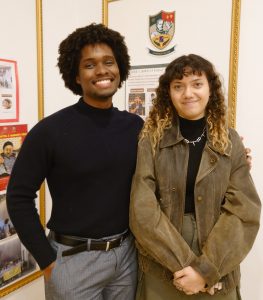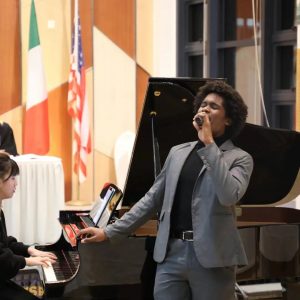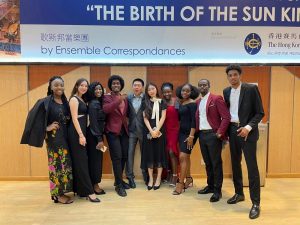Felipe Barbosa is a Cape Verdean student in the Department of Communication at the University of Macau (UM). Due to the historical relationship between Cape Verde and Portugal, he has developed a strong interest in the culture of Macanese people (‘Macanese’ in this article refers to people from Macao who are of mixed Portuguese descent), particularly patuá, a Portuguese-based creole spoken by some Macanese people with influences from Cantonese, Malay and Sinhala. Felipe enjoys comparing the linguistic characteristics of patuá with those of the Cape Verdean creole. As a culture enthusiast, he is also interested in examining the challenges that ethnic minorities face in preserving their cultural heritage under globalisation. Furthermore, in his efforts to contribute to the preservation of his culture, Felipe shares music and creates a series of ‘I’m Cape Verdean’ short videos to connect with Cape Verdeans living in different time zones and regions.
Fostering a dialogue on Macanese culture
Moon Chun Memorial College (MCMC) recently held a seminar on Macanese culture. The event attracted many students who had a keen interest in cultural studies. During the seminar, participants engaged in discussions on the cultural significance of patuá. Much to the audience’s surprise, the seminar was not organised by Macanese students; instead, it was organised by Felipe. Hosting the seminar in fluent English, Felipe fostered a vibrant cross-cultural dialogue among Macanese individuals at UM and other attendees.
During the seminar, Felipe made a comparison between the language systems of patuá and Cape Verdean creole, highlighting their similarities as they evolved over time. He also discussed the inheritance of creoles in the context of globalisation and the cultural identity of ethnic minorities. As part of the seminar programme, a documentary video created by Felipe and a fellow student was showcased. The video, featuring the stories of three Macanese individuals from different generations, depicts their cultural contexts and the current state of patuá in Macao. Reflecting on the seminar, Felipe said, ‘The discussion was inspiring. It prompted me to think about the meaning of cultural continuity.’
Putting ideas into practice to seek residential college support
Only two weeks passed from the inception of the idea to initiate a cross-cultural dialogue, to collaborating with the resident assistant to organise the event, to its successful execution. Felipe’s motivation to hold the seminar stemmed from his desire to create lasting memories in MCMC and share his knowledge with other students, as he is about to graduate this year. With encouragement from MCMC’s resident fellow Alice Hong, Felipe translated his ideas into action and, together with another student, drafted the seminar proposal. Without hesitation, Felipe approached Dr Manuel Noronha, MCMC’s associate master, to seek his support for the event.
Despite Felipe’s unexpected request, Dr Noronha contacted his network at UM to reach out to Macanese individuals at the university, including both faculty and students, to engage them in the cultural exchange event.
Discovering the fun of patuá
Felipe’s first encounter with patuá took place in the MCMC library. It was shortly after his arrival in Macao, and the library was where he made interesting discoveries during his free time. One day, he came across a book about patuá. As he started reading, he was surprised to find that he understood this language he had never learned—the words in the book bore a striking resemblance to the Cape Verdean creole. Looking at this language he seemingly understood, Felipe felt a deep touch to his heart. He shared, ‘Cape Verdean creole is a simplified language formed by Portuguese, English, French and African languages. It is amazing how much it has in common with patuá.’
With his new-found passion for patuá, Felipe has become a regular participant in seminars about Macanese culture, both within and outside the university. The law of attraction seemed to be in action when Felipe met Sofia de Campo Silva in a Department of Communication course. Sharing similar views on the formation of cultural identity, the two UM members clicked instantly. Together, they created the documentary video showcased during the Macanese culture seminar. Through Sofia’s introduction, Felipe was also acquainted with the Macanese community, allowing him to gain first-hand insights into the lives of contemporary Macanese people.
Unleashing the power of music
One may often hear Felipe singing and playing music when passing by the MCMC rehearsal studio. His music talent has undeniably enriched MCMC’s music culture. Indeed, before studying at UM, Felipe showcased his remarkable abilities in the Cape Verdean music talent show ‘Voice One’, where he outperformed numerous competitors and advanced to the semi-final. At UM, Felipe has become a frequent performer at various events, ranging from cultural galas to talent shows and high table dinners. It is also worth mentioning that Felipe did not learn to play the piano until he started his studies at UM. Through participating in MCMC’s art and music courses, Felipe formed friendships with other students who shared with him their music knowledge and expertise, enhancing his musical abilities.
Due to his experience participating in ‘Voice One’, Felipe was invited by Macao local singers to perform at Para Club in the City of Dreams shortly after he arrived in the city. Recalling that memorable night, Felipe jokingly mentioned how he asked some of his schoolmates and friends to occupy the front row at Para Club to enhance the atmosphere, as he was worried nobody would enjoy his performance. However, his performance turned out to be mesmerising, capturing the audience’s interest and appreciation. Furthermore, Felipe was invited by the Macau-Cape Verde Friendship Association to sing at the Lusofonia Festival in 2022, where he showcased the enchanting charm and vibrant energy of Cape Verdean music.
Connecting Cape Verdeans through short video creations
With tightly coiled curls and a well-built physique, Felipe describes himself as a typical Cape Verdean who longs for a carefree lifestyle and hopes to gaze upon the azure sky and vast ocean every day. However, he acknowledged that a significant number of Cape Verdeans have chosen to leave their home country in search of opportunities abroad, resulting in the formation of a diaspora. In view of this, Felipe has created a series of ‘I’m Cape Verdean’ short videos. Drawing inspiration from his own life experiences, his videos aim to resonate with his audience through self-teasing, humour and playful jokes. By sharing these videos on Instagram, Felipe hopes to bridge the distances that separate the Cape Verdean diaspora and foster a sense of togetherness among them.
On average, Felipe’s Instagram posts gather over 10,000 views each, with some even achieving more than 90,000 views. The popularity of his videos surprised him, as he did not initially anticipate the role they would play in connecting Cape Verdeans scattered across different time zones and regions. Recognising the significance of his creations, Felipe, despite a busy schedule filled with studies and singing commitments, remains dedicated to producing and sharing these short videos. Through his creations, he hopes to not lose sight of his roots and cultural heritage while pursuing his dreams. His motivation can be attributed to his deep affection for his home country.
Making efforts towards cultural preservation
In addition to his love for Cape Verde, Felipe also finds motivation in the perseverance of Macao people. As a Communication student, he had the opportunity to intern at the Portuguese channel of TDM Macau last semester. During his internship, he was assigned to cover a news story at Lai Chi Vun Shipyards in Coloane, where he encountered an elderly shipbuilder. Despite his old age, the shipbuilder milled wood every day to make models of ships, in an effort to preserve the traditional skill of shipbuilding. This encounter left a profound impact on Felipe, as he said, ‘Witnessing the efforts of everyone in Macao to preserve the culture they cherish is inspiring.’
Having travelled halfway across the globe to come to Macao, Felipe acknowledged that he also faced challenges posed by cultural differences. However, these differences have not hindered his exploration of Macao’s unique culture. Each time he strolls through the streets of the city, he discovers something that fills him with awe and wonder. Looking ahead, Felipe will continue to document his life in Macao and create videos—he is committed to sharing his stories of Macao and UM with others.
Text: Kelvin U, UM Reporter Wang Chuyue
English translation: Bess Che
Photos: Editorial Board, with some provided by the interviewees
Source: My UM Issue 132

